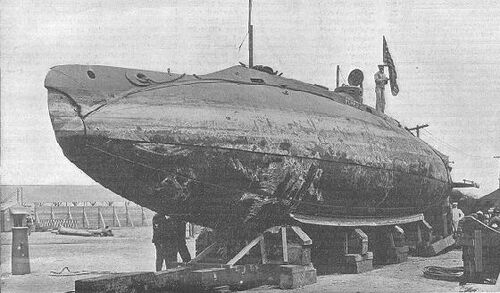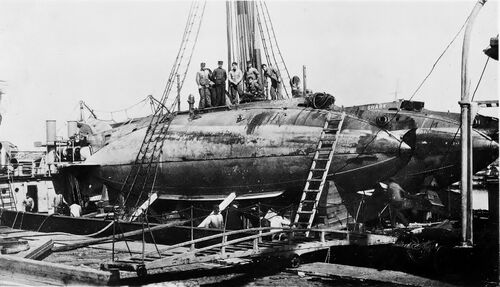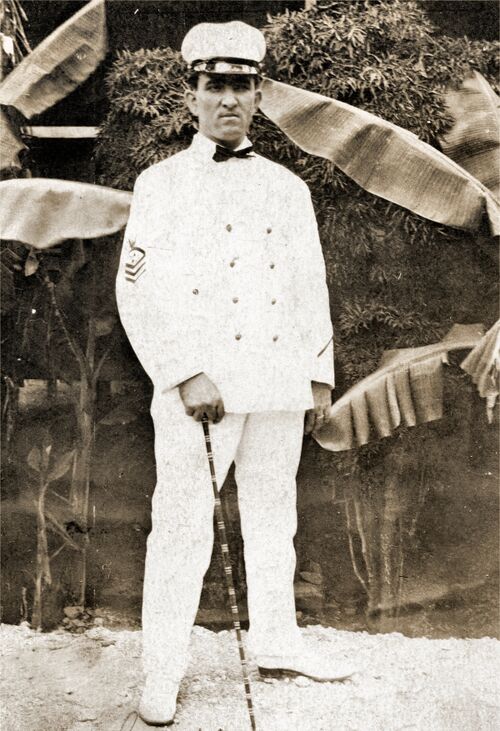A-6: Difference between revisions
No edit summary |
No edit summary |
||
| Line 11: | Line 11: | ||
Porpoise deck loaded on the USS Caesar (Collier No. 16) for transport to the Philippines, April 1908. Her sister Shark is sitting next to her. These boats were completely unable to make the voyage themselves, so this was the best way of doing it, and it worked well. | Porpoise deck loaded on the USS Caesar (Collier No. 16) for transport to the Philippines, April 1908. Her sister Shark is sitting next to her. These boats were completely unable to make the voyage themselves, so this was the best way of doing it, and it worked well. | ||
Porpoise and Shark did a number of things together. It had been reported in the news media (The | Porpoise and Shark did a number of things together. It had been reported in the news media (The Evening Star, Washington D.C. of November 14, 1909) that the two submarines were used in an experiment to prove it was safer to travel though stormy weather submerged rather than on the surface. | ||
The subs, commanded by Ensign Kenneth Whiting of the Porpoise and Ensign Theodore G. Ellyson of the Shark, were at Olongapo shipyard and were to travel to Cavite through a typhoon. Once the storm was near the subs left port and submerged, traveling at a depth that allowed only the tops of their flag staffs to protruded from the water, (probably about 15 feet). The crews, volunteers all to perform this feat, were tossed about the whole time agreed that the excitement was enjoyed by all. Once the storm ended the submarines surfaced and moored at Cavite. Prior to this submarine were to find shelter or be on the surface. | The subs, commanded by Ensign Kenneth Whiting of the Porpoise and Ensign Theodore G. Ellyson of the Shark, were at Olongapo shipyard and were to travel to Cavite through a typhoon. Once the storm was near the subs left port and submerged, traveling at a depth that allowed only the tops of their flag staffs to protruded from the water, (probably about 15 feet). The crews, volunteers all to perform this feat, were tossed about the whole time agreed that the excitement was enjoyed by all. Once the storm ended the submarines surfaced and moored at Cavite. Prior to this submarine were to find shelter or be on the surface. | ||
Revision as of 17:15, 10 January 2024

Photo in the private collection of Rid Hedman.

Porpoise deck loaded on the USS Caesar (Collier No. 16) for transport to the Philippines, April 1908. Her sister Shark is sitting next to her. These boats were completely unable to make the voyage themselves, so this was the best way of doing it, and it worked well.
Porpoise and Shark did a number of things together. It had been reported in the news media (The Evening Star, Washington D.C. of November 14, 1909) that the two submarines were used in an experiment to prove it was safer to travel though stormy weather submerged rather than on the surface.
The subs, commanded by Ensign Kenneth Whiting of the Porpoise and Ensign Theodore G. Ellyson of the Shark, were at Olongapo shipyard and were to travel to Cavite through a typhoon. Once the storm was near the subs left port and submerged, traveling at a depth that allowed only the tops of their flag staffs to protruded from the water, (probably about 15 feet). The crews, volunteers all to perform this feat, were tossed about the whole time agreed that the excitement was enjoyed by all. Once the storm ended the submarines surfaced and moored at Cavite. Prior to this submarine were to find shelter or be on the surface.
U.S. Navy photo via Navsource.org.
USS Porpoise (Submarine No. 7) crew muster for April 15, 1910. Data is incomplete due to lost records.
| Vande Parr James P. - Ensign - age 24 - Born: New York |
| Brown Harley H. - MM 1c - age 27 - Born: Vermont |
| Dergrinan, William - EM 1c - age 31 - Born: Missouri |
| Gratner, John L. - MM 2c - age 23 - Born: Texas |
| Hodson, Emil - SN - age 25 - Born: Montana |
| Irwin, Max A. EM 2c - age 23 - Born: Missouri |
| Kimbel, Andrew J. - EM 2c - age 25 - Born: Indiana |
| Mc Farland, Otis H. - CGM - age 26 - Born: Indiana |
| Stack, James F. - GM 2c - age 23 - Born: Massachusetts |
| Storey, Norman H. - CEM - age 34 - Born: Maryland |
| Van Sickle, William E. - CMM - age 31 - Born: Missouri |
Thank you to Linda Talbott of the US GenWeb Census Project® for providing this information.

The following information is from an email from Gary Howell, a family member.
"Attached is the photo of William E. Van Sickle. I don't know much about his service other than the 1910 census, where he is listed as a sailor on the USS Porpoise in Manila. On his WWI draft registration and 1940 census, he is a Machinist at the Washington Navy Yard. Whether he was still in the Navy or a civilian worker in 1917, I don't know."
"His parents were Eli Van Sickle and Anna Elizabeth Horn, who was my Great Great Grandmother's sister. This makes him my first cousin, three times removed. It is a source of great pride to have a pioneering Submariner in my family."
Photo courtesy of MM2(SS) Gary R. Howell, USN.
Page created by:
Ric Hedman & David Johnston
1999 - 2023 - PigBoats.COM©
Mountlake Terrace, WA, Norfolk, VA
webmaster at pigboats dot com
